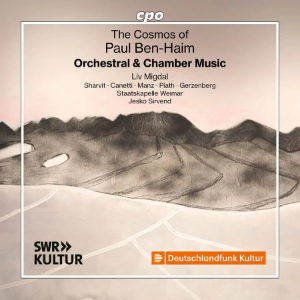
Paul Ben-Haim (1897-1984)
The Cosmos of Paul Ben-Haim
Orchestral & Chamber Music
rec. 2023, Weimar, Germany
cpo 555 621-2 [2 CDs: 142]
Paul Ben-Haim, born Paul Frankenburger in Munich, had a successful career with the Augsburg Opera before he was forced to flee Nazi Germany. In Palestine, he selected a Hebrew surname (it means ‘son of Heinrich’). He is now regarded as Israel’s most significant musician.
Violinist Liv Migdal, who has sought to champion Ben-Haim’s music outside Israel, selected the programme on this set. It is built around four arrangements he made of his Three Songs Without Words, and around the four instruments he employed. Violin, violoncello, clarinet and bassoon provide a common thread.
For me, by far the most attractive work here is the poem for violin and orchestra Yizcor (Evocation). A memorably lyrical work, it combines a varied and effective orchestration with soaring lines for the violin, and the more or less obligatory fireworks. The cadenza is Ben-Haim’s own, rather Jascha Heifetz’s one in the published score.
Ben-Haim’s compositional career received a musical impulse from the pioneering Israeli folk singer, songwriter, musicologist and actress Bracha Zefira. The native music of Palestine prompted him to try to forge an Israeli national musical style. He arranged folk songs, and became interested in the Sephardic music from Northern Spain. Earlier, he had been aware of those Jewish melodies because they influenced Ravel and Debussy. He adopted Sephardic melodies into a synthesized style.
This is what he wrote about the Three Songs Without Words,in which Sephardic melismata form a core: “Anyone whose imagination requires the aid of additional interpretation, can think of the oppressive heat of summer in the Judean mountains, then the monotonous mumble of the oriental story-teller, and finally a traditional folk-song sung by Spanish Jews – a real jewel.” Three different arrangements of these vocalises might seem like overkill, but the differing sound worlds of violin, clarinet, bassoon and violoncello successfully avoid any sensation of excessive repetition. The beautiful, lilting Berceuse Sfaradite for violin and piano became one of Ben-Haim’s most popular works.
As he developed his style into one based on folk sources, his original rather chromatic output, as typified by To the Chief Musician,changed to one devoid of chromaticism on display in Dance and Evocation. His predilection for melodic transformation is shown off by the Interpretation of Bach’s Choral Prelude for orchestra.
The Weimar orchestra play all the orchestral works very well indeed, and Jesko Sirvend conducts with appropriate flexibility. The Israeli mezzo-soprano Hagar Sharvit sings the vocal works with considerable aplomb. Clarinettist Sebastian Manz, bassoonist Theo Plath, violoncellist Ofer Canetti and pianist Daniel Gerzenberg all play their parts with the excellence that their professional histories would suggest.
The booklet in English and German has very full biographical details of Ben-Haim and the performers.
Jim Westhead
Buying this recording via a link below generates revenue for MWI, which helps the site remain free



Contents
Yizkor (Evocation) – Poem for violin & orchestra (1942)a
Three Songs Without Words for violin and 12 strings (1952)a
Arabic Song for violin and piano (1956)b
Berceuse Sfaradite for violin and piano (1939)b
Dance and Invitation for orchestra (1960)c
Three Songs Without Words for bassoon and 12 strings (1952)d
Kochav nofal (A Star Fell) Three songs for mezzo soprano and piano (1972)e
To The Chief Musician for orchestra (1958)c
Three Songs Without Words for violoncello and piano (1952)f
Bat Yonim (The Little Dove) for mezzo soprano and piano (1940)e
Five Melodies From The East for mezzo soprano and piano (1941-1945, 1970)e
Interpretation of Bach’s Choral Prelude for orchestra (1961)c
Two Easy Pieces for violin and piano (unpublished)b
Three Songs Without Words for clarinet and piano (1952)g
Three Studies for violin solo (1981)h
Performers
a Liv Migdal (violin), Staatskapelle Weimar/Jesko Sirvend
b Liv Migdal (violin), Daniel Arkadij Gerzenberg (piano)
c Staatskapelle Weimar/Jesko Sirvend
d Theo Plath (bassoon), Staatskapelle Weimar/Jesko Sirvend
e Hagar Sharvit (mezzo-soprano), Daniel Arkadij Gerzenberg (piano)
f Ofer Canetti (violoncello), Daniel Arkadij Gerzenberg (piano)
g Sebastian Manz (clarinet), Daniel Arkadij Gerzenberg (piano)
h Liv Migdal (violin)

















